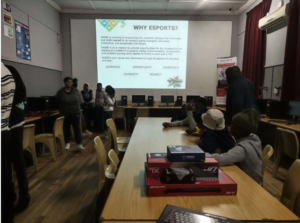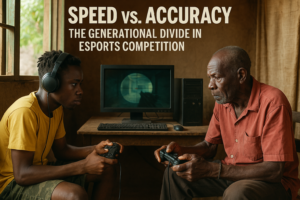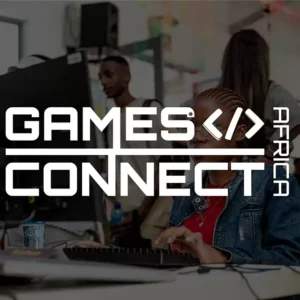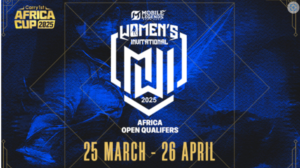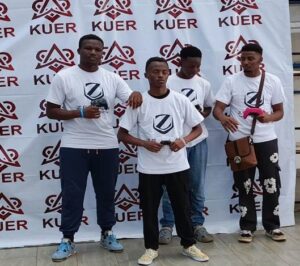African Female Esports Athletes Gain Spotlight — Courtesy of Carry1st and Riot Games

In a world where esports is rapidly becoming one of the fastest-growing industries, Africa’s emerging talent is finally stepping into the limelight — and this time, it’s the women leading the charge. Thanks to a groundbreaking partnership between Carry1st, Africa’s leading mobile games publisher, and global gaming giant Riot Games, African female esports athletes are being propelled to centre stage through an electrifying Mobile Legends: Bang Bang tournament.

This partnership not only signifies a milestone for the African gaming scene but also marks a historic moment for gender representation in esports. It’s the dawn of a new era — where African women, once side lined in competitive gaming spaces, are now rising as champions, innovators, and icons.
Breaking Barriers: The Rise of Female Esports in Africa
For years, the African esports scene has been growing, with countries like South Africa, Nigeria, Kenya, Egypt, and Ghana emerging as regional hubs for competitive gaming. However, female representation remained minimal due to a combination of societal perceptions, limited access to resources, and a lack of opportunities.
Today, things are changing.
Carry1st, known for its commitment to nurturing Africa’s digital economy, recognized the need to create inclusive spaces for women in gaming. By partnering with Riot Games, a global powerhouse behind some of the world’s biggest esports titles, they are strategically breaking down barriers that have historically kept African women on the sidelines.
The Mobile Legends: Bang Bang tournament is not just another esports event. It is a statement — a platform where African female gamers can prove that they belong, that they are just as skilled, strategic, and passionate as their male counterparts.
Why Mobile Legends: Bang Bang?
Mobile Legends: Bang Bang (MLBB) is one of the most popular mobile games in the world, particularly in Southeast Asia and Latin America. Its mobile-first design makes it accessible to a broader audience, especially in Africa, where smartphones are more prevalent than gaming consoles or PCs.
Carry1st’s decision to leverage MLBB is strategic: mobile gaming represents Africa’s fastest-growing gaming segment. By hosting the tournament on a mobile platform, they are tapping into a rich, diverse, and highly engaged player base. More importantly, it levels the playing field, offering women from all backgrounds the chance to participate without needing expensive equipment.
The Impact: More Than Just a Tournament
This collaboration is about more than winning trophies — it’s about rewriting narratives.
Across Africa, girls and young women are watching these tournaments and seeing possibilities that didn’t seem real before. They are witnessing African women lead teams, strategize at professional levels, and compete with fierce confidence. It’s reshaping perceptions within communities where gaming was traditionally seen as a “male pursuit.”
Moreover, this tournament is catalysing wider conversations about digital inclusion, the need for women-focused esports organizations, mentorship programs, scholarships, and infrastructure development to support the next generation of female gamers.
Already, success stories are emerging players who started gaming in cyber cafés are now competing on continental stages. Teams led by women are forming across Ghana, Kenya, Nigeria, and beyond. Social media buzzes with highlights of clutch plays, brilliant strategies, and, more importantly, the joy of representation.
Carry1st: Championing African Gaming Futures
Carry1st, founded in 2018, has consistently positioned itself as a leader in building Africa’s gaming ecosystem. Through publishing, payments solutions, and partnerships, the company has enabled millions of Africans to engage with games and digital content.
This partnership with Riot Games is part of a larger vision: to make Africa a major player on the global esports map.
By focusing on women, Carry1st is setting a progressive precedent. They are not waiting for global trends to dictate Africa’s esports future — they are creating their own movement, led by diversity, innovation, and inclusivity.
Riot Games: A Global Force, Now with an African Footprint
Riot Games’ involvement in this project further emphasizes how seriously the global gaming industry is taking Africa’s potential. Known for titles like League of Legends and Valorant, Riot’s expansion into Africa signals trust in the continent’s rising gaming community.
Their support for a female-focused tournament also reflects Riot’s broader mission to promote diversity, equity, and inclusion within esports. By teaming up with Carry1st, they are not only investing in new markets but also ensuring that the next wave of gaming superstars includes African women.
Stories from the Frontlines: The New Heroes of African Esports
Ama Serwaa, a 20-year-old MLBB player from Accra, Ghana, recalls practicing on borrowed phones in neighborhood cafés. Today, she’s leading one of the top-ranked all-female squads in the tournament.
“I used to think esports was something only boys did,” she says. “Now, I know it’s for anyone who dares to dream — and work hard.”
Meanwhile, Lindiwe Maseko from Johannesburg, South Africa, shares how joining a tournament team boosted her confidence, not just in gaming but in everyday life. “We’re not just playing,” she says. “We’re breaking barriers. We’re telling young girls: you belong here too.”
These stories, once rare, are becoming more common thanks to initiatives like Carry1st and Riot Games’ partnership.
Beyond Gaming: Shaping Africa’s Digital Future
Gaming is more than a hobby; it’s an economic force. Globally, esports generates billions of dollars annually through sponsorships, advertising, and merchandising.
Africa’s gaming market is projected to exceed $1 billion in revenue by 2027. Women gamers represent a massive, largely untapped demographic — one that could drive even greater growth.
By investing in African female esports athletes, Carry1st and Riot Games are nurturing digital literacy, entrepreneurship, and leadership among women. These athletes are not just future world champions — they are future tech innovators, content creators, and community builders.
Challenges Ahead — And the Road to 2030
Of course, challenges remain.
Internet connectivity, access to gaming hardware, and societal stereotypes still pose barriers. Many female gamers report facing harassment and discrimination in online spaces. Sustainable progress will require continued investment in infrastructure, education, and advocacy.
But the seeds have been planted.
By 2030, Africa could be home to some of the world’s top esports players — and a significant portion of them could be women, thanks to initiatives like the MLBB tournament.
The journey won’t be easy, but the momentum is unstoppable.
Esports Africa News believes in the Present and the Future! The Future is Female — And African
The partnership between Carry1st and Riot Games is more than a tournament; it’s a revolution.
African female esports athletes are finally being seen, heard, and celebrated. They’re not asking for permission; they’re taking their rightful place in arenas, leaderboards, and history books.
As the Mobile Legends: Bang Bang tournament continues to ignite passion and possibility across the continent, one truth becomes crystal clear: the future of esports is vibrant, fearless, and unmistakably African — with women leading the way.
And this is only the beginning.
Do you have a story to share, email [email protected]

